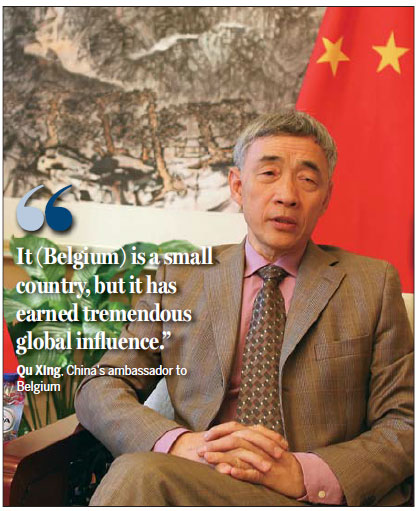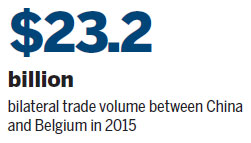Ambassador lauds 45 years of China-Belgium relations

The word "but" is probably the one most frequently on the lips of Qu Xing, China's ambassador to Belgium, when describing this small country in Western Europe and all that it has achieved.
Qu, who took up his diplomatic role in late 2014, has been impressed with the various strengths of Belgium, a country with only half the population of Beijing or Shanghai, that has achieved a great deal.
"It is a small country, but it has earned tremendous global influence," said Qu.
Sitting in the guest room of the newly-refurnished Chinese Embassy that stands next to an avenue lined with dense trees in the outskirts of Brussels, Qu noted that the country has hosted the European Union headquarters, NATO, think-tanks, media and lobbying and commerce organizations in the thousands. Behind him, Chinese and Belgian flags hang next to a wall, typical of an embassy setting.
"Apart from Washington, Brussels should be the second symbol when we talk about the West," said Qu, referring to the wealth of soft power that makes Belgium differ from other European countries.
He added that Belgium has advantages in the fields of research and development, foreign trade, education and logistics, which would be impressive, even for a large nation.
Because China has been in the process of restructuring its economy and boosting outward investment, Qu has been busy exploring cooperative opportunities for Chinese and Belgian businesses by putting as many on-site visits as possible on his daily agenda.
He has visited companies in areas including pharmacy, civil nuclear technology and the micro-electronics sector and has been impressed with them.
Obviously, Belgium is not a big market, "but", he emphasizes, "it has a strong hold on research and development".
Using the country's geographic advantage as a gateway at the heart of the European Union, Belgian people are inclined to develop international trade and explore markets that value Belgium's competitiveness in research. In addition, Belgium boasts convenient water, land and air transportation hubs within a close radius and can easily connect with Paris, Luxembourg, Amsterdam, Frankfurt and other European cities.
Qu noted that Belgium has several universities among the world's top 200 higher education institutions.
All of these factors contribute to it being active in boosting trade and investment.

Qu has spent a lot of time in Europe, having been in Paris between 1986 and 1992 while earning a master's degree and a doctorate in political science at the Paris Institute of Political Studies. Between 2006 and 2009, he worked as the Minister, DCM of the Chinese Embassy to France.
Qu said Belgium, which is nestled between the powers of France, Germany, the United Kingdom and the Netherlands to form a convergence point for Latin and Germanic cultures, has created "its genes of being inclusive, tolerant and open".
It was also among the earliest countries to become industrialized.
Qu said he now has the great responsibility of helping to deepen the bilateral relationship between Belgium and China in several areas.
As a professor who worked as assistant president and vice-president of the China Foreign Affairs University between 1995 and 2006, president of the China Institute of International Studies between 2009 and 2014, he is adept at listing data and forming new narratives in describing the bilateral relationship.
He said businessmen in China and Belgium today handle trade flows every seven hours that equate to the size of an entire year of trade 45 years ago, which was when the nations forged diplomatic ties. This fact is among many comparisons cited by Qu Xing that illustrate the closeness of the partnership the nations have forged during the past few years.
Annual bilateral trade reached $23.2 billion in 2015.
"That's 1,150 times the trading volume at the beginning of our diplomatic relations," he said proudly, adding that the annual growth rate during the past five years has been 16 percent.
He said companies from both nations are more interactive than ever and are investing in one another's enterprises.
For example, Volvo's Ghent plant has been booming since China's Geely took over, said Qu. Every minute, the 5,300 local employees produce one automobile, and this production rate pushed the annual production to a record high of 250,000 automobiles, leading the company to fare well in a relatively sluggish worldwide automobile market.
(China Daily 10/29/2016 page19)














